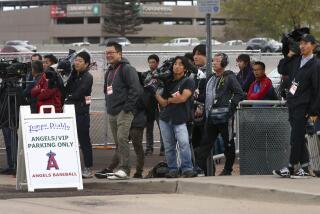Gardner Hopes Little Things Help Him Reach Big Leagues
- Share via
NORFOLK, Va. — Jeff Gardner doesn’t possess the kind of baseball skills that jump out at you.
So when the New York Mets’ brass--General Manager Frank Cashen and Vice President Joe McIlvaine--come down for their occasional scouting excursions, they probably don’t walk away with any outstanding impressions of Gardner, a Tidewater Tides’ second baseman.
As far as baseball tools go, Gardner’s wouldn’t rate in the Black & Decker class. Gardner, a former Estancia High School and Orange Coast College star, doesn’t have the power of Kevin Mitchell, the speed of Rickey Henderson or Ozzie Smith’s flashy glove.
He’s more of a Craftsman.
“You need to see him play for two weeks to appreciate him,” said Mike Cubbage, manager of the triple-A Tides. “He’s sure-handed, and he turns the double play as well as anyone in the major leagues. He does the little things with the bat--bunts and moves guys over--that help the team.”
All those little things might not add up to a big league job with the Mets, though. Even Cubbage admits that Gardner’s best shot will be with an organization other than the infielder-heavy Mets.
“Frankly, he’ll have a hard time making it with this team,” the manager said.
Gardner, who is 5-foot-10, 165 pounds, isn’t discouraged. One thing he has learned in his five minor league seasons is to be realistic.
“Just look at the people the Mets have,” Gardner, 25, said. “They have an infield of Howard Johnson, Kevin Elster, Keith Miller, Gregg Jefferies, Tim Teufel. They’ve got plenty.
“I’m not saying there’s no chance of getting to the big leagues, but as far as me being their second baseman of the future, I’m sure they don’t see that. But that can change.”
Gardner is doing everything he can this summer to make it change. He has put together a solid season at the triple-A level, batting .280 (63 for 225) with 21 RBIs. He had made just five errors in 88 games.
He played sparingly during the first two months of the season because of a back injury, but has platooned at second with Ken Dowell for the past three months. Because Gardner bats left-handed and most opposing pitchers are right-handed, Gardner has been playing a lot.
But when the Mets expand their roster in September, it’s doubtful Gardner will get called up--not when the Tides have infielders such as Tom O’Malley, Jeff McKnight and Phil Lombardi.
What separates those three from Gardner is power and versatility. O’Malley, a third baseman, has 13 home runs and an International League-leading 81 RBIs.
McKnight, who can play all eight field positions and has spent time in New York this season, has nine homers and 47 RBIs. Lombardi, a catcher/first baseman, has 11 homers and 67 RBIs.
Gardner has hit one home run in his professional career and the scope of his defensive ability is pretty much limited to second base.
“It would help if I had a little more pop,” Gardner said. “And it would help if they would let me play third base and shortstop.”
That’s about as close as Gardner will come to complaining. With the ever-present possibility of a trade and the probability of his becoming a free agent after next season, Gardner is not about to storm the front office.
“I know a lot of guys who have demanded to be traded, but I’ve never done anything like that,” Gardner said. “As soon as you start making waves, that might get you out of here, but it also might give you a bad rap.”
Gardner, who spent two summers at double-A Jackson (Miss.) and a season each at Class-A Lynchburg (Va.) and Columbia (S.C.) before coming to Tidewater, has not set a timetable to reach the major leagues.
“I’ve seen too many guys 27, 28 and 29 years old get the chance,” he said. “With as much money as there is in the big leagues, it doesn’t take long to make a bundle. The amount of money up there is unreal.”
The amount of money at the triple-A level is no big deal. Gardner, who is married and has a 2-year-old daughter, makes $2,000 a month and is only paid during the season. That explains why he worked as a waiter at a San Luis Obispo restaurant last winter.
So much for the glamorous life of a professional baseball player. But if Gardner could support his family playing in the minor leagues, he says he would do it forever.
“I love the life style,” Gardner said. “I love having my days free and being around the ballpark at night. I’d love to coach professionally, but I don’t know if, financially, it would be worth it.
“It’s kind of a shame that money has to dictate what we do in life, but those are the cold, hard facts. You need to make some money. And as long as I still have some chance to make the big leagues, I’ll stay. If you don’t have a chance, I think they’ll let you know.”
If it ever gets to that point, Gardner might consider a career in sports broadcasting. He seems as natural behind a microphone as he does handling a double play at second base.
Substituting for ailing Tides radio man Dave Glass one day in May, Gardner conducted a smooth pregame interview with pitcher Wally Whitehurst on a moment’s notice.
“I don’t have the education for it, but I’d love to do something like that,” Gardner said.
Gardner got into his hobby while attending Orange Coast College. He and his high school buddy, Ken Curtis, returned to their alma mater to do basketball play-by-play for videotapes of Estancia’s games. They sell the tapes to families of team members.
The highlight of Gardner’s videotape broadcasting career was when ESTN (Estancia Sports Television Network) was able to bluff an NBC camera crew and a security guard during the 1983 Southern Section basketball championships in the Los Angeles Sports Arena.
Gardner and Curtis were on a TV platform after Estancia’s game and the NBC crew was preparing for the next game between Mater Dei and Long Beach Poly.
“They tried to kick us out, but we said, ‘No, no. We’re ESTN. We’re staying here,’ ” said Gardner, a Times All-County basketball player in 1982. “They let us stay. Afterward, we were going into the locker room and a security guard tried to stop us. We told him we were from ESTN and he let us right through.”
The doors to a professional broadcasting career might not swing open as easily.
“It would be easier to make it in that field if I made it to the big leagues,” Gardner said. “Being a minor league player, I don’t think I’ll be real high on the totem pole as far as announcers, but maybe I could get a lucky break.”
If Gardner is to get a break in baseball, it probably will be with another team--perhaps a new franchise. “Expansion is a couple years away, and that will create 75 to 100 more major league jobs,” Cubbage said. “If Jeff shows improvement and comes up with a big year, he could make it.”
Gardner does what he can to remain optimistic.
“There would be nothing like playing with the Mets, but my best chance will be with another organization,” Gardner said. “I guess only time will tell.”
More to Read
Go beyond the scoreboard
Get the latest on L.A.'s teams in the daily Sports Report newsletter.
You may occasionally receive promotional content from the Los Angeles Times.











